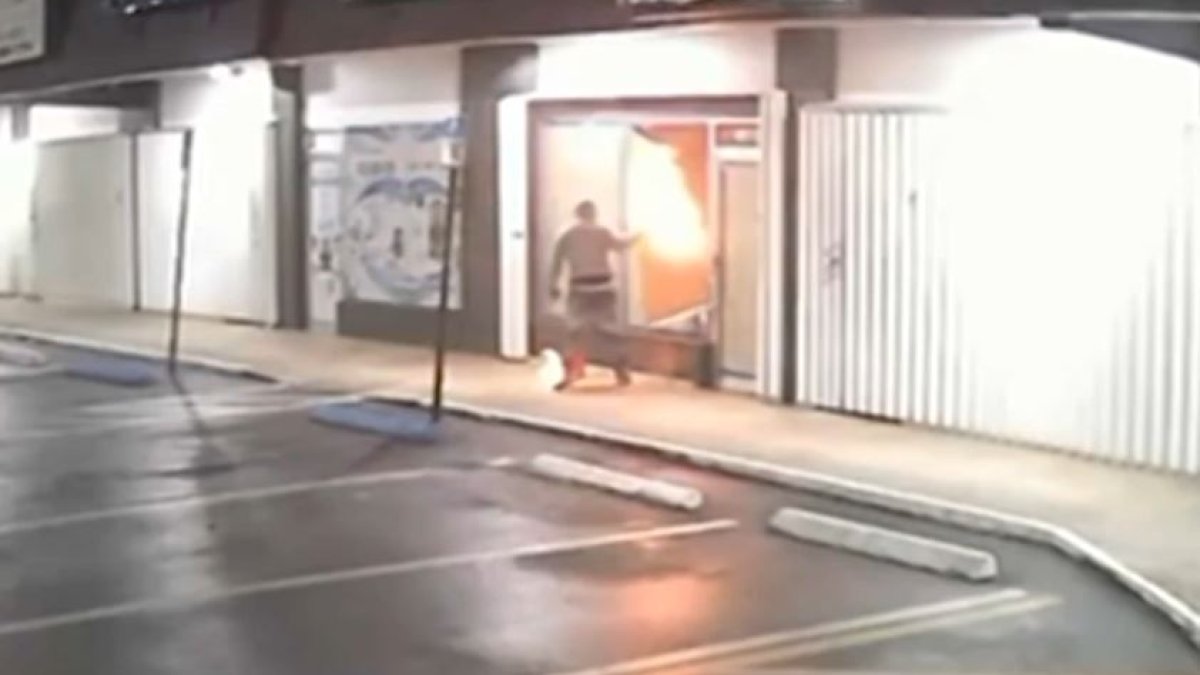George Zimmerman, the neighborhood watch volunteer charged in the killing of Trayvon Martin, surrendered to police Sunday and was booked into jail after having his bail revoked two days earlier.
Wearing a checkered shirt with jeans and sneakers, Zimmerman arrived at the jail in a white minivan and was escorted by two sheriff's officials. As he walked handcuffed into the jail, Zimmerman did not respond to questions from reporters.
He was booked at 1:45 p.m. at the John E. Polk Correctional Facility with no bond status.
The judge revoked Zimmerman's bond Friday, suggesting he and his wife had not been honest about their finances. During a bond hearing in April, the couple had indicated they had limited funds. But prosecutors say Zimmerman had raised thousands through a website he had set up for his legal defense.
Photos of Zimmerman's Surrender.
According to the Seminole County Sheriff Donald Eslinger, Zimmerman will be housed in administrative confinement and separated from other inmates in a single cell. The 67-square-foot cell is equipped with a toilet, two beds, a mattress, pillow, blanket and bed sheets. Zimmerman will not have access to a TV.
Eslinger said Zimmerman was "quiet and cooperative" when he met officers near a highway who took him into custody at 1:25 p.m. and drove him to the jail.
Local
Mark O'Mara told reporters Sunday that Zimmerman understood the judge's concerns and that they would work to address those. He also described his client's demeanor.
"He's solemn, he's worried continually about his safety, having to come out of hiding is a concern of his," O'Mara said.
Zimmerman's legal team said Sunday that they will ask for a new bond hearing to address those concerns, and that they hope Zimmerman's voluntary surrender will show he is not a flight risk. Furthermore, the money Zimmerman has raised is in an independent trust and cannot be directly accessed by Zimmerman or his attorneys, according to the press release.
Zimmerman has pleaded not guilty to the second-degree murder charge. He maintains he shot Martin in self-defense under Florida's so-called "stand your ground" law because the teen, who was unarmed, was beating him up after confronting Zimmerman about following him in a gated community outside Orlando.
Zimmerman's credibility could become an issue at trial, legal experts said, noting the case hinges on jurors believing Zimmerman's account of what happened the night in February that Martin was killed.
Zimmerman wasn't charged in the case until more than a month after the shooting. Protests were held across the nation, and the case spurred debate about whether race was a factor in Zimmerman's actions and in the initial police handling of the case. Martin was black; Zimmerman's father is white and his mother is from Peru.
Police in Sanford did not immediately arrest Zimmerman, citing the Florida law that gives wide latitude to use deadly force rather than retreat in a fight if people believe they are in danger of being killed or seriously injured.
The questioning of Zimmerman's truthfulness by the judge on Friday could undermine the defendant's credibility if it is brought up at trial. It also may complicate how his defense presents him as a witness, said Orlando-area attorney Randy McClean, a former prosecutor.
"The other key witness, unfortunately, is deceased," McClean said. "Basically, Zimmerman is going to be asking the jury to believe his version of the facts. ... As the case stands now, his credibility is absolutely critical to the case."
Zimmerman went into hiding in the weeks after the shooting and it is still unknown where he stayed after he bonded out of jail.
Witness accounts of the rainy night that Martin was shot are spotty. There is no video of the fight, though photos released by prosecutors show Zimmerman with wounds to his face and the back of his head.
Zimmerman's credibility would be important if his attorney, Mark O'Mara, tries to get a judge without the jury to dismiss the charges based on the law, said Orlando defense attorney David Hill.
"If he was in on something that was not truthfully revealed to the judge, when there is a 'stand your ground' hearing, of course you're going to second-guess him," Hill said.
Both McClean and Hill said O'Mara would be able to challenge the admissibility of the bond revocation at trial by questioning its relevance.
Zimmerman was arrested 44 days after the killing, and during a bond hearing in April, his wife, Shellie, testified that the couple had limited funds available. Zimmerman took the stand at the hearing and apologized to Martin's parents.
Prosecutors pointed out in their motion that Zimmerman had $135,000 available then. It had been raised from donations through a website he had set up. They suggested more has been collected since and deposited in a bank account.
Shellie Zimmerman was asked about the website at the hearing, but she said she didn't know how much money had been raised. Circuit Judge Kenneth Lester set bail at $150,000. The 28-year-old was freed a few days later after posting $15,000 in cash — which is typical.
Prosecutor Bernie De la Rionda complained Friday, "This court was led to believe they didn't have a single penny. It was misleading and I don't know what words to use other than it was a blatant lie." The judge agreed and ordered Zimmerman returned to jail by Sunday afternoon.
The defense countered that Zimmerman and his wife never used the money for anything, which indicated "there was no deceit."
The judge said he would schedule a hearing after Zimmerman is back in custody so he could explain himself.
Benjamin Crump, an attorney for Trayvon Martin's parents, Tracy Martin and Sybrina Fulton, said his clients have always said Zimmerman should remain in jail until trial.



